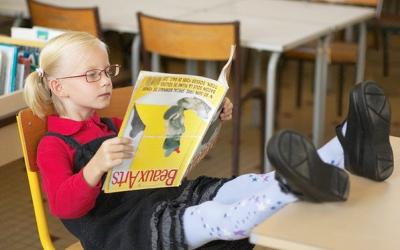From 'Charlotte's Web' to Charlotte on the Web
Q. What role does the digital revolution play in the culture of children’s reading?
“It’s very fashionable right now to moan about the death of print media. When it comes to children’s literature, the fear of losing print becomes stronger because it echoes the fear we have of children themselves, who were, by some miracle, born more technologically adept than we are. But even if print media should one day become extinct and the children of the future have only screens, literature will still be literature. Nothing will ever take the place of a good story, for both children and grownups.”
Q. Does popular cult literature, such as “Diary of a Wimpy Kid,” have literary value?
“One of the most urgent issues we’ll be discussing at the conference is taste censorship – in other words, whether literature should be censored for children on the grounds that it is lowbrow, cheap or just plain stupid. Are mothers right when they say, ‘At least they’re reading’? Or is playing on the computer better for them than reading 'Diary of a Wimpy Kid,' with its easy vocabulary and all its pictures? Anyone who is curious about the answer, as I am, should attend the conference.”
Q. The conference schedule lists questions such as “Are children excluded from literature by adults?” and “Why are voices still being silenced?” What does that mean?
“Like children’s culture as a whole, children’s literature is controlled by adults who write, illustrate, censor, buy, market and make it available to children. Within this tightly-controlled field, it’s interesting to see whether any bit of it still belongs to the children themselves. Don’t children deserve to create and consume literature on their own? Maybe, for the first time in history, technology is making this anarchistic idea possible and forcing authors to ask themselves whether they are writing faithfully in a child’s voice. The question about ‘voices still being silenced’ refers to groups and sectors on the fringe of society that have almost no representation in Israeli children’s literature.”
Q. Where does your connection to the world of children’s literature come from?
“The particular sector known as children – and for now I will talk about that sector as a single, homogeneous entity because I have no alternative – fascinates me. All of us were children, but many of us forget what it was like and stop being interested in it the moment it’s over. The culture that’s offered to children attracts me in particular because that’s what shapes our cultural perceptions as adults who consume and create culture. I love lots of books for children and teenagers. 'The BFG' by Roald Dahl is one of the funniest, most enchanting books I know. I loved it as a child and I go back and reread it today too, especially when I’m feeling down. I think my tastes haven’t changed since I first started reading, and even today I’m still influenced by what I loved as a little girl. Children get so completely wrapped up in cultural products that it makes a person jealous, so I really want to be successful at writing for them and find out the secret of people who have already accomplished that.”
By Ravit Hecht

